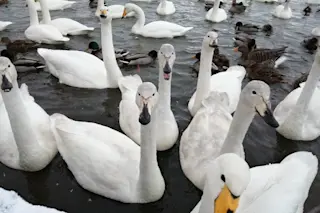According to a recent study from the University of Exeter and the Wildfowl & Wetlands Trust (WWT), swans are willing to give up sleep to find the best foraging spots.
The study focused on mute and whooper swans residing in the WWT Caerlaverock National Nature Reserve in Scotland via live-stream webcam. The webcam allowed researchers to monitor four key behaviors — foraging, maintenance (preening, cleaning and oiling feathers), aggression and resting. The findings indicate that the swans would trade resting for aggression when it comes to the best foraging spots.
"These swans use aggression if there's competition over foraging areas," says Paul Rose, from the University of Exeter and WWT in a press release. "Our findings show that this requires a trade-off, and that both species reduce resting time to allow for this aggression.”
Rose also noted that while there was a trade off between resting and foraging, there was ...















